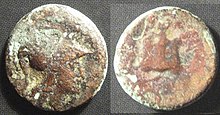The Coinage of Side refers to numismatic objects produced at Side, an ancient Greek colony in modern-day Pamphylia, Turkey.


- 490BC—?54AD[1]
The earliest recorded coinage from Side, silver staters, date to approximately 490–400 BC. From this time up until the reign of the Roman Emperor Claudius the coinage of Side is representative of a fine Hellenic style, often featuring the Helmeted busts of Athena on the obverse and the figure of Nike on the reverse.[2] A frequent theme on Side coinage was the pomegranate fruit,[2] as Side was the name for pomegranate in the local language, which is the city's name.[1][3][4][5][6]
References
edit- ^ a b Turkish Odyssey Perge-Aspendus-Side-Alanya Archived 2006-11-14 at the Wayback Machine "Side was founded by Aeolians of the Aegean region. The history of the town extends back to the 7C BC. "Side" meant "pomegranate" in the local language. Until the Roman Imperial period, pomegranate was the symbol used on the coins of Side. "
- ^ a b Sear, David R. (1978). Greek coins and their values. London: Seaby. ISBN 978-0-900652-46-2.
- ^ "Greek SIDE (Pamphylia) AE13. EF-. 1st century BC. Athena - Pomegranate". MA-Shops. Archived from the original on 1 March 2023. Retrieved 1 March 2023.
- ^ "PAMPHYLIA, SIDE. AR Stater, circa 460-410 BC. Pomegranate / Athena". VCoins. Archived from the original on 1 March 2023. Retrieved 1 March 2023.
- ^ "Numismatica Ars Classica - Auction 96 Lot 1114". NumisBids.com. Archived from the original on 1 March 2023. Retrieved 1 March 2023.
Pamphylia, Side. Stater, circa 460-430 BC, ...Pomegranate within guilloche border. Rev. Head of Athena r., wearing Corinthian helmet, hair in queue. All within incuse square.
- ^
- "Pamphylia, Side - Ancient Greek Coins". WildWinds.com. Retrieved 1 March 2023.
- Side, Pamphylia, AE16. ca. 310-380 BC. Helmeted head of Athena right. / ΣIΔH, pomegranate on a stalk, caduceus to left. SNG France III 772; SNG Pfalz 487-488 cngcoins.com, auction 145, lot 108, Aug. 2006.